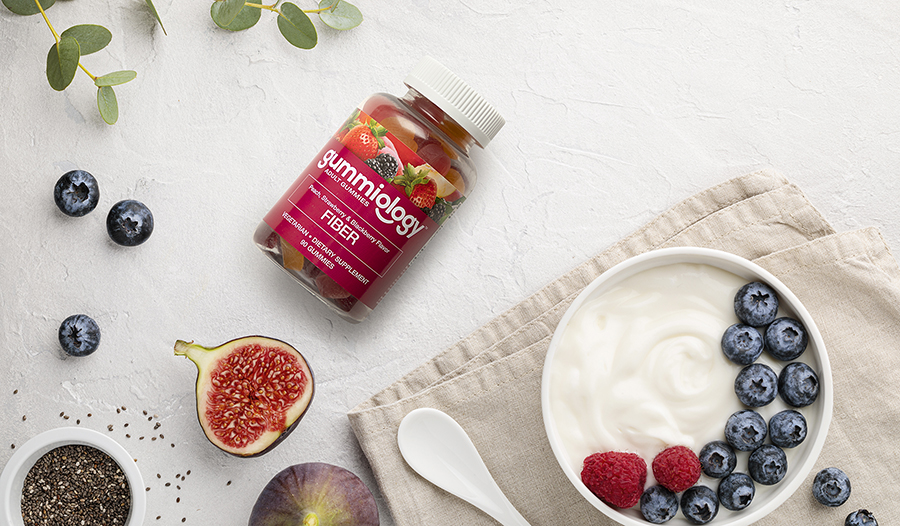Какво представляват постбиотиците? И как се отнасят към пре- и пробиотиците?

Вероятно никога не сте чували този термин, но постбиотиците са на дневен ред в науката за здравето на червата и микробиома. Пребиотиците и пробиотиците може би са по-познати, но и трите са свързани във взаимозависима връзка, която е от решаващо значение не само за здравето на храносмилателната система, но и за психичното ни здраве - благодарение на оста черва-мозък. Освен върху психичното ви здраве, чревният ви микробиом оказва голямо влияние върху имунното, храносмилателното, метаболитното и сърдечното ви здраве.
Нека разгледаме постбиотиците и техните ползи за здравето.
Какво представляват постбиотиците?
Постбиотиците представляват странични продукти от пробиотиците , които се консумират , пребиотиците. . Точно така! Когато ядете зърнени храни или пресни плодове, фибрите в тях се считат за пребиотични. След това пробиотиците разграждат фибрите, като ги превръщат в метаболити, които наричаме постбиотици.
Пробиотиците създават различни съединения от ферментацията на пребиотици, считани за постбиотици. Късоверижните мастни киселини (SCFA), функционалните протеини и извънклетъчните полизахариди (EPS) са само три примера за това, което може да се опише като постбиотици.
Проучванията показват, че постбиотиците, които съдържат функционални биоактивни съединения, имат пряко благоприятно въздействие върху имунната система. Проучванията показват също, че постбиотиците могат да се използват при здрави хора за подобряване на общото здравословно състояние. Състояния като атопичен дерматит, диария и бебешки колики също се повлияват от постбиотиците.
Дефицит на фибри и постбиотици
Здравата постбиотична микрофлора започва с фибри. За здравия чревен микробиом е важно не само количеството консумирани фибри, но и разнообразието от фибри, което е необходимо за създаването на постбиотични метаболити, необходими за доброто здраве.
Консумирането на разнообразни растителни храни ще увеличи и разнообрази консумацията на фибри и следователно ще укрепи пребиотичното ви здраве - което пряко ще повлияе на постбиотичния ви статус. Плодове, зеленчуци, зърнени хрании бобовите растения са добър източник на фибри.
Трябва да приемате около 25 грама фибри на ден, но не повече от 50 грама. Прекалено многото фибри могат да доведат до симптоми като подуване на корема, намален апетит, спазми и запек и могат да нарушат усвояването на фосфор и калций. .
Здрави чревни бактерии, основа на доброто здраве
Здравият чревен микробиом е свързан с всичко - от силна имунна система до добро психично здраве. Микробиомът се отнася до микроорганизмите, които живеят в определена среда. Докато в тялото ви и върху него живеят трилиони микроорганизми (микроби), включително гъбички, бактерии и вируси, само в червата ви живеят още трилиони - около 100 трилиона.
По-голямата част от тези микроби живеят в една част на дебелото черво, наречена цекум. Само бактериите съставляват около четиридесет трилиона клетки в тялото ви, което е доста завладяващо, когато си дадете сметка, че имате само тридесет трилиона човешки клетки. Този факт сам по себе си показва значението на вашата микробиота.
Някои от тези бактерии се оказват полезни и ги наричаме добри или приятелски бактерии; други остават вредни и могат да причинят заболяване.
За пръв път се сблъскваме с микробите, когато се движим по родовия канал на майка си. Колкото повече остарявате, толкова по-богат и разнообразен става вашият микробиом.
Бифидобактериите, приятелски микроорганизми, започват да се развиват рано в червата на новороденото, за да подпомогнат смилането на захарите в кърмата. Тази бактерия остава важна през целия живот, тъй като създава SCFA - основен постбиотик, необходим за доброто здраве.
С напредването на възрастта в червата ви се заселват повече бактерии, които носят ползи за храносмилането, имунната система, сърцето, метаболизма и психичното здраве.
5 ключови ползи за здравето от здравия микробиом
Силната чревна микрофлора е от съществено значение за доброто общо здраве.
Здраве на храносмилателната система
Добрите бактерии, или пробиотиците, чрез храносмилането на фибрите са крайъгълният камък на доброто постбиотично здраве. SCFA, произвеждани от бактериите, разграждащи фибрите, спомагат за метаболизирането на мазнините и въглехидратите. Те са основният източник на енергия за клетките на дебелото черво.
Увеличаването на теглото може да бъде причинено от дисбиоза - дисбаланс между добрите и лошите бактерии в червата. Дисбиозата може да допринесе и за състояния като възпалително заболяване на червата (IBD) и синдром на раздразнените черва (IBS). Симптоми като дискомфорт, подуване на корема и спазми са свързани с дисбиоза.
Приемане на пробиотици с бифидобактерии и Лактобацили може да помогне на хората да избегнат дискомфорта, причинен от IBS и IBD.
Имунно здраве
Вашата чревна микрофлора е от съществено значение за имунното ви здраве. Той регулира имунната хомеостаза или баланса в организма. Промените в чревните микробни съобщества могат да доведат до дисрегулация на имунната система, допринасяйки за автоимунно заболяване не само на червата, но и за системно автоимунно заболяване.
Поради тази значителна връзка между чревния микробиом и имунната система изследователите понастоящем проучват нови микробни терапии като потенциални методи за лечение на автоимунни и други заболявания.
Здраве на сърцето
Здравите черва могат да допринесат за здраво сърце. Едно проучване установи, че чревната микрофлора насърчава добрия холестерол, липопротеините с висока плътност (HDL) и триглицеридите. Когато се приема като пробиотик, Lactobacillus може също да помогне за намаляване на нивата на холестерола. Намаляването на общия холестерол и повишаването на нивата на добрия холестерол продължават да са важни за здравето на сърцето и кръвоносните съдове.
Високите нива на холестерол и ниските нива на HDL допринасят за образуването на плаки по артериалните стени, което може да доведе до инфаркт и инсулт. Оризът с червена мая е естествена добавка, която може да помогне за понижаване на нивата на холестерола.
Триметиламин N-оксид (ТМАО) се произвежда от неприятелски настроените бактерии в червата, когато те метаболизират холин и L-карнитин. . ТМАО е съединение, което допринася за запушването на артериите. Както холинът, така и L-карнитинът се съдържат в храни от животински произход, особено в червено месо.
Намаляването на консумацията на животински продукти и поддържането на здравословен микробиом може да помогне за намаляване на вероятността чревните ви бактерии да създават ТМАО.
Метаболитно здраве
Диабетът и нивата на кръвната захар също могат да бъдат повлияни от чревната микрофлора. Проучване установи, че въпреки че участниците са яли една и съща храна, нивата на кръвната им захар след хранене са се различавали значително. Изследователите отбелязват, че причината за това различие може да е разликата в чревните микроби.
Друго проучване пък установи, че разнообразието на чревния микробиом значително намалява преди появата на диабет тип 1. Те откриват също, че нивата на различни видове нездравословни бактерии се увеличават преди появата на диабет тип 1.
Психично здраве
Напоследък оста черва-мозък е обект на много научни изследвания. Гореща тема за обсъждане е откритието, че чревните бактерии играят ключова роля в производството на мозъчни невротрансмитери.
Невротрансмитерите означават химични вещества в мозъка, които потискат или насърчават различни физиологични действия в организма. Невротрансмитерът серотонин се синтезира основно в червата. Серотонинът има много функции в организма, включително регулиране на настроението и насърчаване на чувството за благополучие и щастие. Освен това подпомага съня и храносмилателните функции.
5-HTP и триптофан представляват естествени добавки, които могат да помогнат за повишаване на нивата на серотонин.
Как да подобрим постбиотичния си микробиом
Пребиотици
За да имате здрав микробиом, първо трябва да имате добри пребиотици.
Пребиотиците представляват храни с високо съдържание на фибри като инулин и други съединения като фруктоолигозахариди (FOS). FOS не само поддържа здравословната чревна флора, но и спомага за понижаване на холестерола и поддържа здрава имунна система.
Доказано е, че FOS и инулинът стимулират растежа на бифидобактериите в червата. Бифидобактериите имат инхибиторен ефект в червата, като помагат за устойчивост на остри инфекции.
Друг мощен пребиотик, който насърчава растежа на бифидобактериите, са пшеничните трици - външният слой на пълнозърнестите пшенични зърна. Пшеничните трици съдържат голямо количество арабиноксиланови олигозахариди (AXOS). Освен че подпомага растежа на приятелски бактерии, AXOS има и антиоксидантни свойства.
Инулинът представлява вид фибри, които естествено се съдържат в лука, чесъна, артишока, зелените листа на глухарчето. , аспержи и корен от цикория. Можете също така да добавите инулин, ако не консумирате достатъчно богати на инулин храни в диетата си.
FOS може да бъде открит в големи количества в чесъна, банани, синьо агавеи праз.
Пектин и бета-глюкан
Пектинът и бета-глюканът представляват пребиотици, които спомагат за регулирането на чревната микрофлора. Пектиновите влакна се съдържат в ябълки, круши, гуава, сливи и цитрусови плодове.
Увеличете нивата на бета-глюкан , като консумирате повече овес . , ечемик, морски водорасли и гъби от вида рейши. , мейтаке, и шийтаке .
Пектинът и бета-глюканът също могат да се добавят за пребиотична подкрепа.
Глюкоманан
Приемането на повече слонски батат заради високото съдържание на глюкоманан фибри също ще подпомогне здравословните и разнообразни постбиотици. Глюкомананът подпомага растежа на добрите бактерии в червата, като същевременно понижава холестерола, подпомага загубата на тегло, подобрява имунната функция и намалява запека.
Можете да приемате добавки с глюкоманан за по-голяма подкрепа.
Ферментирали храни
Ядене на ферментирали храни като кефир, кисело мляко, комбуча, и кисело зеле може да увеличи нивата на пробиотиците , подобрявайки постбиотичния ви статус. Ферментиралите храни повишават основно нивата на лактобацилите. Те могат също така да намалят нивата на лошите бактерии в червата.
Избягването на изкуствени подсладители като аспартама също може да подпомогне постбиотичното ви здраве. Те стимулират растежа на недружелюбни бактерии, включително Enterobacteriaceae, в чревната микрофлора.
Не на последно място, избягвайте приема на антибиотици, ако можете. Антибиотиците унищожават както добрите, така и лошите бактерии в червата. Приемайте ги само когато това е необходимо от медицинска гледна точка.
Долната линия
Постбиотиците са в основата на доброто общо здраве. Мозъчните, сърдечните, имунните и чревните клетки зависят от постбиотиците, за да функционират оптимално.
Най-добрият начин за поддържане на добър постбиотичен статус включва прием на повече пребиотици и увеличаване на пробиотичната флора. Само при добър пребиотичен и пробиотичен статус можете да се възползвате от предимствата на здравословния постбиотичен микробиом.
Препратки:
- Wegh CAM, Geerlings SY, Knol J, Roeselers G, Belzer C. Постбиотици и техните потенциални приложения в храненето в ранна възраст и след това. Int J Mol Sci. 2019;20(19):4673. Публикувано 2019 Sep 20. doi:10.3390/ijms20194673
- Kumar VP, Prashanth KV, Venkatesh YP. Структурни анализи и имуномодулиращи свойства на фрукто-олигозахариди от лук (Allium cepa). Въглехидрати Полимери 2015;117:115-122. doi:10.1016/j.carbpol.2014.09.039
- Costa GT, Abreu GC, Guimarães AB, Vasconcelos PR, Guimarães SB. Въздействие на фрукто-олигозахаридите върху нивата на серумния холестерол. Преглед. Acta Cir Bras. 2015;30(5):366-370. doi:10.1590/S0102-865020150050000009
- Kolida S, Tuohy K, Gibson GR. Пребиотични ефекти на инулина и олигофруктозата. Br J Nutr. 2002;87 Suppl 2:S193-S197. doi:10.1079/BJNBJN/2002537
- Chen HL, Cheng HC, Liu YJ, Liu SY, Wu WT. Конякът действа като естествено слабително средство, като увеличава обема на изпражненията и подобрява екологията на дебелото черво при здрави възрастни. Хранене. 2006;22(11-12):1112-1119. doi:10.1016/j.nut.2006.08.009
- Tester RF, Al-Ghazzewi FH. Благоприятни здравни характеристики на нативен и хидролизиран глюкоманан от коняк (Amorphophallus konjac). J Sci Food Agric. 2016;96(10):3283-3291. doi:10.1002/jsfa.7571
- François IE, Lescroart O, Veraverbeke WS, et al. Ефекти на екстракта от пшенични трици, съдържащ арабиноксиланови олигозахариди, върху стомашно-чревните параметри при здрави деца в предюношеска възраст. J Pediatr Gastroenterol Nutr. 2014;58(5):647-653. doi:10.1097/MPG.0000000000000285
- Clemens R. et al. Запълване на недостига на фибри в Америка: резюме на кръгла маса за проучване на реалистични решения с акцент върху храните на зърнена основа. J Nutr. 2012 July; 142(7): 1390S-1401S.
- Berdy J. Биоактивни микробни метаболити. J. Antibiot. 2005;58(1):1.26.
- Shah M, Chandalia M, Adams-Huet B, et al. Влияние на диетата с високо съдържание на фибри в сравнение с диетата с умерено съдържание на фибри върху баланса на калций и други минерали при лица с диабет тип 2. Diabetes Care. 2009;32(6):990-995. doi:10.2337/dc09-0126
- Sender R, Fuchs S, Milo R. Revised Estimates for the Number of Human and Bacteria Cells in the Body. PLoS Biol. 2016;14(8):e1002533. Публикувано 2016 Aug 19. doi:10.1371/journal.pbio.1002533
- Консорциум за изследователска мрежа за интегративна ХМП (iHMP). Интегративен проект за човешкия микробиом: динамичен анализ на омичните профили микробиом-гостоприемник по време на периоди на човешко здраве и болест. Клетъчен хост Микроби. 2014;16(3):276-289. doi:10.1016/j.chom.2014.08.014
- Arboleya S, Watkins C, Stanton C, Ross RP. Популациите на бифидобактериите в червата при човешкото здраве и стареене. Front Microbiol. 2016;7:1204. Публикувано 2016 Aug 19. doi:10.3389/fmicb.2016.01204
- Ríos-Covián D, Ruas-Madiedo P, Margolles A, Gueimonde M, de Los Reyes-Gavilán CG, Salazar N. Чревни късоверижни мастни киселини и връзката им с храненето и човешкото здраве. Front Microbiol. 2016;7:185. Публикувано 2016 Feb 17. doi:10.3389/fmicb.2016.00185
- Ridaura VK, Faith JJ, Rey FE, et al. Чревната микрофлора на близнаци с различна степен на затлъстяване модулира метаболизма при мишки. Наука. 2013;341(6150):1241214. doi:10.1126/science.1241214
- Wu HJ, Wu E. Ролята на чревната микрофлора в имунната хомеостаза и автоимунитета. Чревни микроби. 2012;3(1):4-14. doi:10.4161/gmic.19320
- Fu J, Bonder MJ, Cenit MC, et al. Микробиомът на червата допринася за значителна част от вариациите на липидите в кръвта. Circ Res. 2015;117(9):817-824. doi:10.1161/CIRCRESAHA.115.306807
- Shimizu M, Hashiguchi M, Shiga T, Tamura HO, Mochizuki M. Мета-анализ: Effects of Probiotic Supplementation on Lipid Profiles in Normal to Mildly Hypercholesterolemic Individuals. PLoS One. 2015;10(10):e0139795. Публикувано 2015 Oct 16. doi:10.1371/journal.pone.0139795
- Wang Z, Klipfell E, Bennett BJ, et al. Метаболизмът на фосфатидилхолина в чревната флора насърчава сърдечносъдовите заболявания. Природа. 2011;472(7341):57-63. doi:10.1038/nature09922
- Zhu W, Wang Z, Tang WHW, Hazen SL. Генерираният от чревни микроорганизми триметиламин N-оксид от хранителния холин е протромботичен при субекти. Циркулация. 2017;135(17):1671-1673. doi:10.1161/CIRCULATIONAHA.116.025338
- Koeth RA, Wang Z, Levison BS, et al. Метаболизмът на L-карнитина, хранителна съставка в червеното месо, в чревната микрофлора насърчава атеросклерозата. Nat Med. 2013;19(5):576-585. doi:10.1038/nm.3145
- Zeevi D, Korem T, Zmora N, et al. Персонализирано хранене чрез прогнозиране на гликемичните реакции. Клетка. 2015;163(5):1079-1094. doi:10.1016/j.cell.2015.11.001
- Kostic AD, Gevers D, Siljander H, et al. Динамика на чревния микробиом на кърмачетата в процеса на развитие и прогресия към диабет тип 1. Клетъчен хост Микроби. 2015;17(2):260-273. doi:10.1016/j.chom.2015.01.001
- O'Mahony SM, Clarke G, Borre YE, Dinan TG, Cryan JF. Серотонин, метаболизъм на триптофана и оста мозък-чрево-микробиом. Behavior Brain Res. 2015;277:32-48. doi:10.1016/j.bbr.2014.07.027
- Yano JM, Yu K, Donaldson GP, et al. Местните бактерии от чревната микрофлора регулират биосинтезата на серотонин в организма на гостоприемника [публикуваната корекция е публикувана в Cell. 2015 Sep 24;163:258]. Клетка. 2015;161(2):264-276. doi:10.1016/j.cell.2015.02.047
- Palmnäs MS, Cowan TE, Bomhof MR, et al. Консумацията на ниски дози аспартам оказва диференцирано влияние върху метаболитните взаимодействия между чревната микрофлора и гостоприемника при плъхове със затлъстяване, предизвикано от диета. PLoS One. 2014;9(10):e109841. Публикувано 2014 Oct 14. doi:10.1371/journal.pone.0109841
ОТКАЗ ОТ ОТГОВОРНОСТ:Този УЕЛНЕС ХЪБ няма за цел да поставя диагнози...

















































































 Съдържание
Съдържание
















